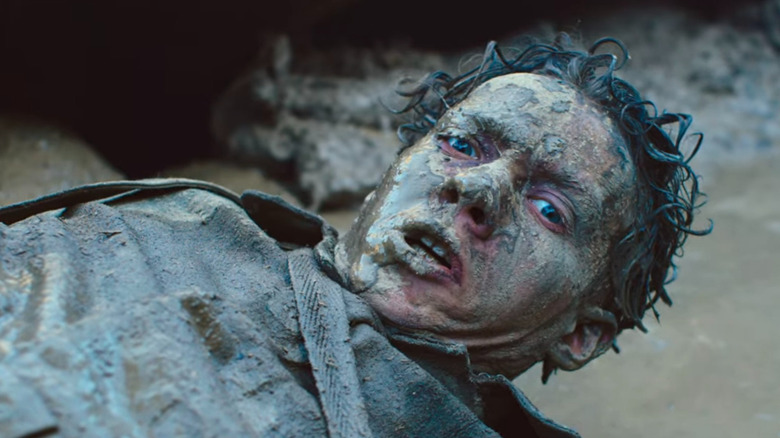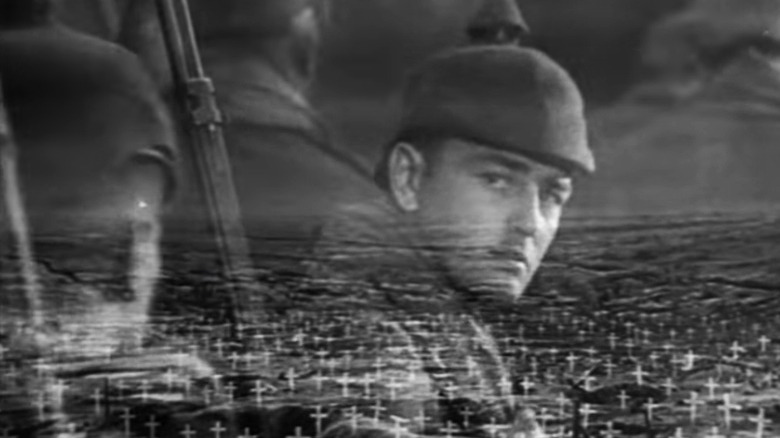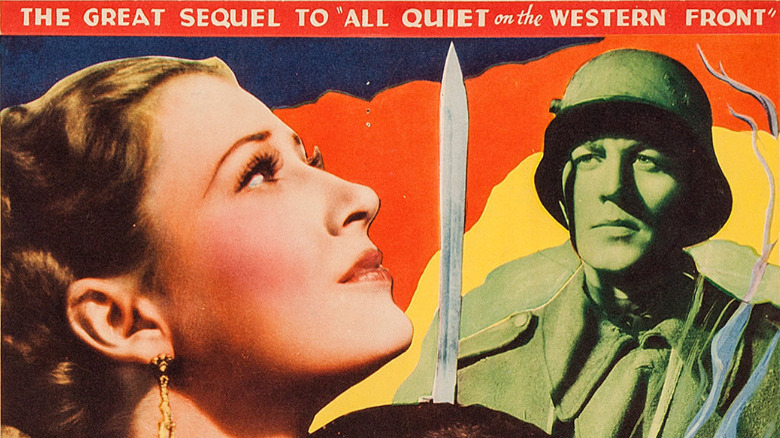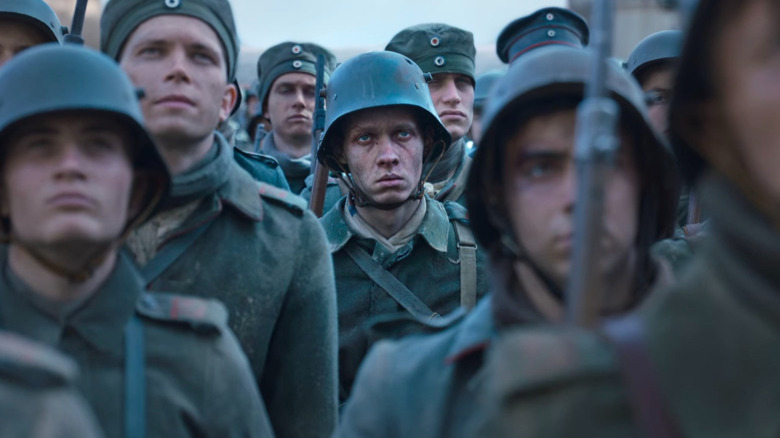The All Quiet On The Western Front Sequel That You Didn't Even Know Existed
If Jane Austen were alive today, and if for some baffling reason she wrote film criticism instead of brilliant novels, she'd probably say it is a truth universally acknowledged that a film that makes a fortune must be in want of a sequel.
Sure enough, no matter how much the industry changes, the desire to capitalize on a hit film by making another one just like it, rubber-stamped for audience familiarity, must be overwhelming. The history of cinema is littered with sequels and for each one that audiences remember — for better or worse — there's at least one that's almost completely forgotten, even if they're the sequel to a film that won Best Picture at the Academy Awards.
Indeed, there are more forgotten Best Picture sequels than you might expect. George C. Scott reprised his Oscar-winning role as General George S. Patton 16 years later, in the TV movie "The Last Days of Patton." It's been a long time since anyone's brought up the sequel to "Terms of Endearment," Robert Harling's "The Evening Star," at the dinner table. And hey, remember "Scarlett," the six-hour TV mini-series sequel to "Gone with the Wind?" We don't talk about that for obvious reasons.
But perhaps none of the Best Picture sequels made so much of a stir, and then got so very buried by history, as James Whale's "The Road Back," the sequel to the classic anti-war film "All Quiet on the Western Front."
A whale of a tale
Lewis Milestone's "All Quiet on the Western Front," adapted from the best-selling novel by Erich Maria Remarque, tells the story of young German men convinced by propaganda to join the valiant war effort, only to discover that World War I is a shameful, unending hell of psychological trauma, physical punishment, and death on an unfathomable scale. "All Quiet on the Western Front" remains, to this day, one of the few war films that never even accidentally makes war seem noble, and it features imagery and dialogue that still stings nearly 100 years later.
"All Quiet on the Western Front" won the Best Picture Oscar in 1931 — over impressive competition that's aged very well, like the prison drama "The Big House" and the morality tale "The Divorcée" — and it made money. And fortunately for Hollywood, they didn't even have to make up the sequel on their own. Remarque had already published a follow-up, "The Road Back," in 1931, detailing the sad story of soldiers returning home from the war, changed men in a changed world.
For the sequel, Universal Pictures enlisted the director of some of their biggest hits. James Whale, who helped define a generation of horror movies with "Frankenstein," "The Bride of Frankenstein" and "The Invisible Man," and who had just expanded his impressive resumé with the hit musical "Showboat," took the reins of the new war epic with a powerful imprimatur, and social commentary to spare. Ironically, a director who helped steer the studio away from war movies and into the horror realm would now be responsible for steering the studio back.
Then it all went really, really wrong.
War (movie) is hell
"The Road Back" was blocked at nearly every turn. The film went nearly $200,000 over budget and 19 days over schedule. There were delays due to weather conditions. James Whale contracted the flu. An extra died in an on-set explosion.
What's more, Whale's version was re-shot to feature more romantic love scenes and to prevent the ending from specifically decrying the rise of Nazi Germany in the mid-1930s. The new ending instead declared that, despite the horrors of World War I, the war machine continued in all countries, so we are all equally to blame for whatever horrors came next (*cough* World War II *cough*). Which is ... let's just call it "a take."
The film was also in the crosshairs of Georg Gyssling, a German diplomat who monitored Hollywood for the Nazi Party and had some sway with the Production Code Authority, Hollywood's system of self-censorship. Gyssling wanted many cuts made to the film and sources differ on whether Universal capitulated at his request. But the cuts surely weren't supported by James Whale, who had been a German prisoner in World War I, and who refused to even take a meeting with him.
All of this was on top of the studio's insistence that the script include light comedy sequences with actors Slim Summerville, the only returning cast member from "All Quiet on the Western Front," and character actor Andy Devine. The effect was a pretty major tonal shift, not just from Lewis Milestone's grim and severe original film, but even within Whale's own feature, with whimsy contrasting oddly with serious social commentary and dramatic scenes about soldiers processing life-altering trauma.
In any case, none of these changes helped "The Road Back" find an audience in Nazi Germany, which banned both the sequel and the original. Years later, Whale's film was re-released with new footage, now decrying Nazi Germany, and featuring new footage of an actor playing Hitler.
The road forward
For many years "The Road Back" was only available in its highly edited, 70-minute form, but the film's original cut — completed with studio-mandated material, but a new, full 30 minutes longer cut, was eventually restored by the Library of Congress, with funding from Martin Scorsese's Film Foundation, in 2016.
Good luck trying to find it, however. Unlike "All Quiet on the Western Front," which is readily available on multiple streaming services and has been released on home video multiple times, "The Road Back" is difficult to find in any format. Although, a low-quality transfer of the 100-minute version can be found online if you go hunting for it.
With audiences largely unable to watch any version of the movie, the legacy of "The Road Back" is relatively minimal. It's the subject of a scene in Bill Condon's Oscar-winning film "Gods and Monsters," a biopic about James Whale starring Sir Ian McKellen and Brendan Fraser. And the 2022 remake of "All Quiet on the Western Front" incorporates at least one element from "The Road Back" — a subplot about the looming armistice — that wasn't present in the original film.
It's unfortunate that a film whose story is this interesting, whose very existence was considered a threat to Nazi Germany, is so largely unknown today. But now you know, and its legacy, for better and worse, can live on.



